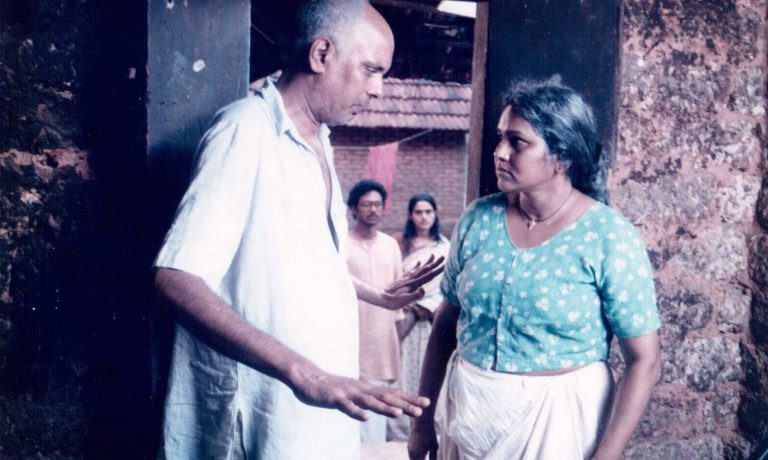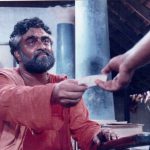Festivals: Toronto, London, Nantes, Pesaro, Rotterdam, Goteborg, Ljubljana, Munich, Vienna, Fribourg, Washington DC, New York, Denver, Hawaii, Paris, Tokyo, and Fukuoka among others.
Awards: International Film Critics Prize (FIPRESCI) at MAMI film festival, Mumbai
National Awards for Best film and Best Supporting actress.
Kerala State awards for Best Director, Best supporting actor and Best supporting actress
The Background
Once the political freedom from the British was achieved, there was a whole lot of issues related to economic freedom, social justice and so on…
Short Synopsis
A society in transition – from a cast-iron feudal order to the plastic present – provides the backdrop as well as the thematic material of the film.
The film traces the rational yet difficult course of the growth and development of a middle class mind – gentle, sensitive and impressionable – who ultimately finds release from his timidity and inhibitions as he discovers creativity in himself as a writer.
Historical References
The film progresses with response to and in response to some of the very significant historical events such as:
- The National Freedom Movement (India became independent from the British in 1947).
- The film begins about a decade before Independence; The assassination of Mahatma Gandhi, who led the freedom movement, in 1948,
- The Kerala Land Reforms legislated by the first democratically elected Communist Government in 1959,
- The Naxalite uprising of 1968 (The term ‘Naxal’ is derived from the name of a village, Naxalbari in West Bengal; here started a Maoist movement of ultra leftists who exhorted armed class war against cruel landlords and unscrupulous moneylenders. Echoes of this ‘People’s War’ reached Kerala too resulting in many violent attacks and confrontations),
- Declaration of a State of Emergency in India – 1975-1977 when any expression of dissidence was banned,
- The Left Political Front comes back to power in Kerala (1980-82).
Synopsis
 Vasu, his uncle, was a sort of legend in the house. Kunjunni’s late grandfather had sent Vasu to study in England so that he could be a high ranking civil servant in His Majesty’s Service. But that was not to be; responding to Mahatma Gandhi’s call, he abandons his studies and joins the national struggle for freedom from the British.
Vasu, his uncle, was a sort of legend in the house. Kunjunni’s late grandfather had sent Vasu to study in England so that he could be a high ranking civil servant in His Majesty’s Service. But that was not to be; responding to Mahatma Gandhi’s call, he abandons his studies and joins the national struggle for freedom from the British.Kunjunni’s mother’s health, poor to start with, gets worse despite all the medical treatment she is given.
Now a University student and an idealist, kunjunni like any other sensitive youth of the times takes to Communist ideology.
Years pass by and the world’s first democratically elected Communist Government comes to power in Kerala.
One night, Kunjunni is summoned home as his mother’s illness worsens. His father who is also sent for by the grandmother, finally arrives a bit too late to see his wife.
 The new land legislations of the Communist Government takes away the agricultural lands from absentee landlords in an attempt to give land to the tiller. Kunjunni’s family is suddenly improverished. His grandmother has no option but to send away the maid-servant and her three daughters from service. Kunjunni is a silent and helpless witness to their tearful parting.
The new land legislations of the Communist Government takes away the agricultural lands from absentee landlords in an attempt to give land to the tiller. Kunjunni’s family is suddenly improverished. His grandmother has no option but to send away the maid-servant and her three daughters from service. Kunjunni is a silent and helpless witness to their tearful parting.On the estate manager’s plea, he is briefly let out on parole to perform his grand-mother’s funeral rites.
As he goes about the rites, Kunjunni limps – a legacy of the torture while in Police custody.
Eventually he is released when the Court acquits him. Now a lonely man, disillusioned yet not bitter; a lot more mature and richer with experience, he goes seeking out Meenakshi, his childhood friend. He finds her, marries her and sets home in the ancestral house.
Then one day, uncle Vasu, now a changed man in spiritual pursuit returns in saffron clothes. He wants his share of the property when sold, to be sent to his wife and children – an act of penitence by one who had denied his domesticity all along.
To Kunjunni’s great relief, there comes a ready buyer – a newly rich – for the house and property; who would spend money to erase his novo rich stigma.
At a time when Kunjunni has stopped thinking of his father, there comes news about him
Kunjunni sits down to write. His vast experience of life and living, men and ideas….is distilled into an essential perception.
Direcor’s Statement
The protagonist has lived through a tumultuous period of recent history in India, particularly Kerala from pre-independence to the Eighties. Born into a feudal family, but imbibing the spirit of the times, he gets attracted to the revolutionary movement and sets about changing the society. In the process he gets changed too. The film is his story as well as history of nearly half a century telescoped into a highly emotional tale of love, longing, denunciation and generosity.
The story has started off from biographical elements but I have not transplanted my personal experience directly into it. The family the hero comes from is one like mine. I was born in breach delivery causing immeasurable pain to my mother. My parents were living separated and we children grew up under the care of a single parent – my mother. In the film, I have introduced a grand-mother who virtually runs the filmily as the mother is sickly. But then the similarities end there as I had to universalize a personal experience in the form of a credible narrative and coherent dramaturgy.
While the struggles and sacrifices people make for the cause of social change are noble and uplifting, disillusionment sets in at the stage of achievement when one is confronted with a denial of its very aims from the centre of power that emerges. Political power and authority find ways of perpetuating it in the hands of those who come to wield it and build mechanisms, however ruthless, to protect it. Even with the realization of eventual defeat, the individual free spirit keeps fighting.
Filmmakers and Critics Say
-Derek Malcolm, THE GUARDIAN
-Maithili Rao, THE HINDU
-Madhu Jain, INDIA TODAY
-Deepa Gahlot, TIMES OF INDIA
-S. Prasannarajan, INDIAN EXPRESS
-Iqbal Masud, PERSONAL VIEWPOINT
-Subhra Gupta, SUNDAY
-Saibal Chatterjee, OUTLOOK
-Donald Richie
Credits:
- Story, Script, Dialogue & Direction: Adoor Gopalakrishnan
- Produced by Adoor Gopalakrishnan in collaboration with Japan Broadcasting Corporation NHK
- Producer on the NHK side: Tokuichi Ogawa
- Cinematography: Ravi Varma
- Audiography : Harikumar
- Editing: M. Mani
- Music : Vijaya Bhaskar
- Art Direction: Sivan
- Make-up: P N. Mani
- Stills: Razzak Kottakkal
- Production Controller: Kettidathil Vijayan
- Production Company: Adoor Gopalakrishnan Productions
- Duration 107 Mts.
- Length 2935.55 meters
- Color Eastman
- Year of Production 1995 November
- Language Malayalam
- Country India
Cast & characters:
- Viswanathan (Kunjunni)
- Mini (Meenakshi)
- Aranmula Ponnamma (Grand mother)
- Urmila Unni (Mother)
- Jagannatha Varma (Father)
- Narendra Prasad (Uncle Vasu)
- Babu Namboothiri (Veluchar the estate manager)
- Lalitha (Janamma the servant- maid)
- Oduvil Unnikrishnan (Pachupilla – Janamma’s husband)
- Ravi Vallathol (Stepbrother)
- Mukesh (Newly-rich)
- Jagadeesh (Journalist)
- P.C. Soman (Ayurvedic doctor)
- S.S. Nair (Astrololger)
- M.K. Gopalakrishnan (Teacher)
- T.S. Raju (Police Inspector)
- Mithun (Kunjunni- boy)
- Sreeja Chandran (Meenakshi-girl)
- Akhil (Kunjunni-Child)
- Divya, Anju (Meenakshi’s sisters)
- Murukan (Comrade)
- Sudhakaran (Jail head-warder)
- Mannarkkayam Rajan (Tea-shop boy)
- K.P.S. Kurup (Village elder)
- Mavelikara Ramachandran
- K.K. Chandran
- M.R.N. Unnithan (Relatives)
- Aliyar, Kamal (On-lookers at the grocery shop)
- Jayaraj (Activist), Padmanabha Panikkar, Rose Mohan,
- Balan (Police-man)
- Adoor Pankajam, Adoor Bhavani, Gladys (Neighbour women)









